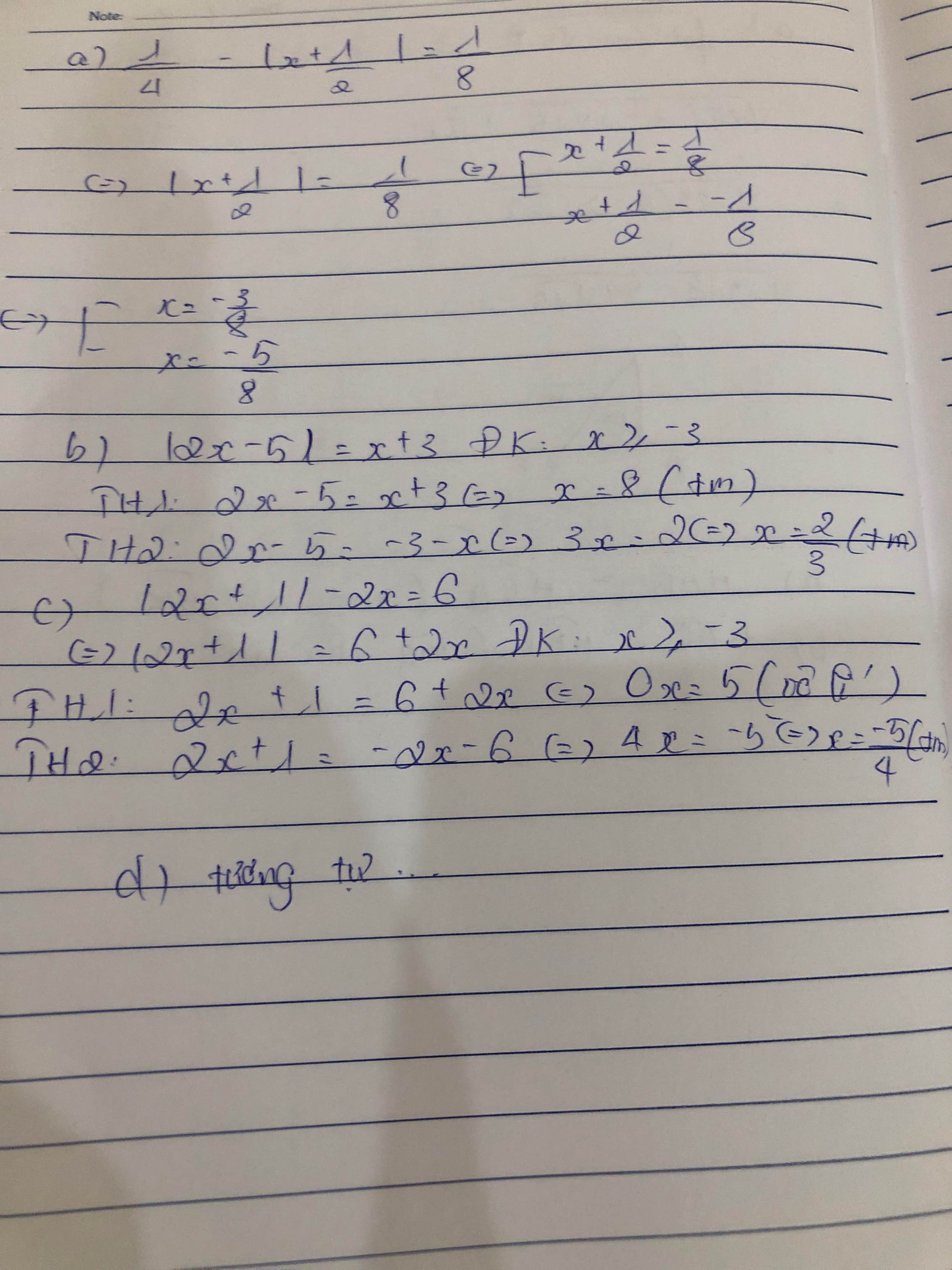Tìm `x`
`8^x` $\text{6}$$^{-2x}$ `=4^5`

Những câu hỏi liên quan
Tìm số thập phân x biết:a) ^{text{x}}^{ }+ dfrac{3}{4} dfrac{4}{5}b) ^{text{x}} - dfrac{1}{2} dfrac{5}{8}c) ^{text{x}} x dfrac{5}{6} dfrac{4}{5} d)^{text{x}} : dfrac{5}{8} dfrac{1}{25}
Đọc tiếp
Tìm số thập phân x biết:
a) \(^{\text{x}}\)\(^{ }\)+ \(\dfrac{3}{4}\)= \(\dfrac{4}{5}\) | b) \(^{\text{x}}\) - \(\dfrac{1}{2}\) = \(\dfrac{5}{8}\) | c) \(^{\text{x}}\) x \(\dfrac{5}{6}\) = \(\dfrac{4}{5}\) | d)\(^{\text{x}}\) : \(\dfrac{5}{8}\) = \(\dfrac{1}{25}\) |
a) \(x=0,05\)
b) \(x=1,125\)
c) \(x=0,96\)
d) \(x=0,025\)
Đúng 1
Bình luận (0)
Bạn tự làm đi dễ mà . Cố mag vận động đầu óc đừng copy làm bài nữa khó lắm mới hỏi thôi
Đúng 1
Bình luận (0)
Bài 4: Tìm x, biết:
a) 3(2x – 3) + 2(2 – x) = –3 ; b) x(5 – 2x) + 2x(x – 1) = 13 ;
c) 5x(x – 1) – (x + 2)(5x – 7) = 6 ; d) 3x(2x + 3) – (2x + 5)(3x – 2) = 8 ;
e) 2(5x – 8) – 3(4x – 5) = 4(3x – 4) + 11; f) 2x(6x – 2x 2 ) + 3x 2 (x – 4) = 8.
\(a,3\left(2x-3\right)+2\left(2-x\right)=-3\\ \Leftrightarrow6x-9+4-2x=-3\\ \Leftrightarrow4x=2\\ \Leftrightarrow x=\dfrac{1}{2}\\ b,x\left(5-2x\right)+2x\left(x-1\right)=13\\ \Leftrightarrow5x-2x^2+2x^2-2x=13\\ \Leftrightarrow3x=13\\ \Leftrightarrow x=\dfrac{13}{3}\\ c,5x\left(x-1\right)-\left(x+2\right)\left(5x-7\right)=6\\ \Leftrightarrow5x^2-5x-5x^2-3x+14=6\\ \Leftrightarrow-8x=-8\\ \Leftrightarrow x=1\\ d,3x\left(2x+3\right)-\left(2x+5\right)\left(3x-2\right)=8\\ \Leftrightarrow6x^2+9x-6x^2-11x+10=8\\ \Leftrightarrow-2x=-2\\ \Leftrightarrow x=1\)
\(e,2\left(5x-8\right)-3\left(4x-5\right)=4\left(3x-4\right)+11\\ \Leftrightarrow10x-16-12x+15=12x-16+11\\ \Leftrightarrow-14x=-4\\ \Leftrightarrow x=\dfrac{2}{7}\\ f,2x\left(6x-2x^2\right)+3x^2\left(x-4\right)=8\\ \Leftrightarrow12x^2-4x^3+3x^3-12x^2=8\\ \Leftrightarrow-x^3-8=0\\ \Leftrightarrow-\left(x^3+8\right)=0\\ \Leftrightarrow-\left(x+2\right)\left(x^2-2x+4\right)=0\\ \Leftrightarrow\left[{}\begin{matrix}x=-2\\x\in\varnothing\left(x^2-2x+4=\left(x-1\right)^2+3>0\right)\end{matrix}\right.\)
Đúng 3
Bình luận (0)
Bài 4:
a: Ta có: \(3\left(2x-3\right)-2\left(x-2\right)=-3\)
\(\Leftrightarrow6x-9-2x+4=-3\)
\(\Leftrightarrow4x=2\)
hay \(x=\dfrac{1}{2}\)
b: Ta có: \(x\left(5-2x\right)+2x\left(x-1\right)=13\)
\(\Leftrightarrow5x-2x^2+2x^2-2x=13\)
\(\Leftrightarrow3x=13\)
hay \(x=\dfrac{13}{3}\)
c: Ta có: \(5x\left(x-1\right)-\left(x+2\right)\left(5x-7\right)=6\)
\(\Leftrightarrow5x^2-5x-5x^2+7x-10x+14=6\)
\(\Leftrightarrow-8x=-8\)
hay x=1
Đúng 0
Bình luận (0)
a/ \(3\left(2x-3\right)+2\left(2-x\right)=-3\)
\(\Leftrightarrow6x-9+4-2x=-3\)
\(\Leftrightarrow4x=2\)
\(\Leftrightarrow x=\dfrac{1}{2}\)
Vậy: \(x=\dfrac{1}{2}\)
===========
b/ \(x\left(5-2x\right)+2x\left(x-1\right)=13\)
\(\Leftrightarrow5x-2x^2+2x^2-2x=13\)
\(\Leftrightarrow3x=13\)
\(\Leftrightarrow x=\dfrac{13}{3}\)
Vậy: \(x=\dfrac{13}{3}\)
==========
c/ \(5x\left(x-1\right)-\left(x+2\right)\left(5x-7\right)=6\)
\(\Leftrightarrow5x^2-5x-5x^2+7x-10x+14=6\)
\(\Leftrightarrow-8x=-8\)
\(\Leftrightarrow x=1\)
Vậy: \(x=1\)
==========
d/ \(3x\left(2x+3\right)-\left(2x+5\right)\left(3x-2\right)=8\)
\(\Leftrightarrow6x^2+9x-6x^2+4x-15x+10=8\)
\(\Leftrightarrow-2x=-2\)
\(\Leftrightarrow x=1\)
Vậy: \(x=1\)
==========
e/ \(2\left(5x-8\right)-3\left(4x-5\right)=4\left(3x-4\right)+11\)
\(\Leftrightarrow10x-16-12x+15=12x-16+11\)
\(\Leftrightarrow-14x=-4\)
\(\Leftrightarrow x=\dfrac{2}{7}\)
Vậy: \(x=\dfrac{2}{7}\)
==========
f/ \(2x\left(6x-2x^2\right)+3x^2\left(x-4\right)=8\)
\(\Leftrightarrow12x^2-4x^3+3x^3-12x^2=8\)
\(\Leftrightarrow-x^3=8\)
\(\Leftrightarrow x=-2\)
Vậy: \(x=-2\)
Đúng 0
Bình luận (0)
1,Tìm x
5^x-5^x+2=650
2x-3/11+2x-4/12+2x-5/13=2x-6/14+2x-7/15+2x-8/6
5^x + 5^ ( x + 2 ) = 650
5x + 5x . 52 = 650
5x .( 1 + 25 ) = 650
5x . 26 = 650
5x = 650 : 26
5x = 25
5x = 52
=> x = 2
Vậy x = 2
Đúng 0
Bình luận (0)
The Reflection Of Light~ Ủa đề là 5^x-5^x+2= 650 sao ông lại đổi thành 5^x-5^(x+2) zậy
Đúng 0
Bình luận (0)
B1:Tìm x
a) (x-7).(x+3)<0
b) (2x+6).(x-5) nhỏ hơn hoặc bằng 0.
B2:Tìm x
a) (5x+8)-(2x-15)+21=2x-5
b) 3.(x-5)-4(x+8)=-12
c) |2x+6|-(-5)^2=3
+. là dấu nhân"x" nhé!
Bài 1L
a) \(\left(x-7\right)\left(x+3\right)< 0\)
TH1:
\(\hept{\begin{cases}x-7>0\\x+3< 0\end{cases}\Leftrightarrow\hept{\begin{cases}x>7\\x< -3\end{cases}}}\)( loại )
TH2:
\(\hept{\begin{cases}x-7< 0\\x+3>0\end{cases}\Leftrightarrow\hept{\begin{cases}x< 7\\x>-3\end{cases}\Leftrightarrow}-3< x< 7}\)( chọn )
Vậy \(-3< x< 7\)
Đúng 0
Bình luận (0)
Bài 2:
a) \(\left(5x+8\right)-\left(2x-15\right)+21=2x-5\)
\(\Leftrightarrow5x+8-2x+15+21=2x-5\)
\(\Leftrightarrow5x-2x-2x=-5-21-8-15\)
\(\Leftrightarrow x=-49\)
Vậy ...
Đúng 0
Bình luận (0)
Bài 1:
b) \(\left(2x+6\right)\left(x-5\right)\le0\)
TH1:
\(\hept{\begin{cases}2x+6\le0\\x-5\ge0\end{cases}\Leftrightarrow\hept{\begin{cases}x\le-3\\x\ge5\end{cases}}}\)( loại )
TH2:
\(\hept{\begin{cases}2x+6\ge0\\x-5\le0\end{cases}\Leftrightarrow\hept{\begin{cases}x\ge-3\\x\le5\end{cases}\Leftrightarrow}-3\le x\le5}\)
Vậy \(-3\le x\le5\)
Đúng 0
Bình luận (0)
Tìm x 2.(5x-8)-3(4x-5)=4(3x-4)+11 3 . 2(x³-1)-2x²(x+2x⁴)+(4x⁵+4)x=6
`2//(5x-8)-3(4x-5)=4(3x-4)`
`<=>5x-8-12x+15=12x-16`
`<=>-19x=-23`
`<=>x=23/19` Vậy `x=23/19`
`3//2(x^3-1)-2x^2(x+2x^4)+(4x^5+4)x=6`
`<=>2x^3-2-2x^3-4x^6+4x^6+4x=6`
`<=>4x=8`
`<=>x=2` Vậy `x=2`
Đúng 2
Bình luận (0)
Tìm đkxđ của: 1, 3x/ 4x-8 2, 2x/ x²-9 3, 6/x³+1 4, 6x²/x²-2x+1 5, x-2/x²+3 6, 2x/x²+3+2
1) \(\dfrac{3x}{4x-8}\)
\(ĐKXĐ:4x-8\ne0\Leftrightarrow x\ne2\)
2) \(\dfrac{2x}{x^2-9}\)
\(ĐKXĐ:x^2-9\ne0\Leftrightarrow\)\(\left\{{}\begin{matrix}x\ne3\\x\ne-3\end{matrix}\right.\)
3) \(\dfrac{6}{x^3+1}=\dfrac{6}{\left(x+1\right)\left(x^2-x+1\right)}\)
\(ĐKXĐ:\)\(x+1\ne0\Leftrightarrow x\ne-1\)
(do \(x^2-x+1=\left(x-\dfrac{1}{2}\right)^2+\dfrac{3}{4}\ge\dfrac{3}{4}>0\))
4) \(\dfrac{6x^2}{x^2-2x+1}=\dfrac{6x^2}{\left(x-1\right)^2}\)
\(ĐKXĐ:x-1\ne0\Leftrightarrow x\ne1\)
5) \(\dfrac{x-2}{x^2+3}\)
Do \(x^2+3>0\forall x\in R\)
Vậy biểu thức trên xác định với mọi x
6) \(\dfrac{2x}{x^2+3x+2}=\dfrac{2x}{\left(x+1\right)\left(x+2\right)}\)
\(ĐKXĐ:\)\(\left\{{}\begin{matrix}x+1\ne0\\x+2\ne0\end{matrix}\right.\)\(\Leftrightarrow\left\{{}\begin{matrix}x\ne-1\\x\ne-2\end{matrix}\right.\)
Đúng 1
Bình luận (0)
Tìm x
a.2x+(1+2+3+4+...+100) = 15150
b.(x+1)+(x+2)+(x+3)+(x+4)+(x+5)+(x+6)+(x+7)+(x+8)=36
c.0+0+4+6+8+...+2x=110
\(2x+\left(1+2+3+...+100\right)=15150\)
\(2x+\left[\left(1+100\right)+\left(2+99\right)+...+\left(50+51\right)\right]=15150\)
\(2x+\left[101+101+...+101\right]=15150\)CÓ 50 SỐ 101
\(2x+\left[101\times50\right]=15150\)
\(2x=15150:5050\)
\(2x=3\)
\(x=3:2\)
\(x=1.5\)
Đúng 0
Bình luận (0)
a, 2x + (1+2+3+4+...+100) = 15150
=> 2x + \(\frac{\left(1+100\right).\left[\left(100-1\right)+1\right]}{2}\)= 15150
=> 2x + \(\frac{101.100}{2}\)= 15150
=> 2x + 5050 = 15150
=> 2x = 15150 - 5050
=> 2x = 10100
=> x = 10100 : 2
=> x = 5050
Vậy x = 5050
b, .(x+1)+(x+2)+(x+3)+(x+4)+(x+5)+(x+6)+(x+7)+(x+8)=36
=> (x + x + x + x +x + x +x +x ) + (1 + 2 + 3 + 4 + 5 + 6 + 7 + 8) = 36
=> 8x + 36 = 36
=> 8x = 0
=> x = 0
Vậy x = 0
c, 0+0+4+6+8+...+2x=110
Sửa đề :0 + 2 + 4 + 6 + 8 + ... + 2x = 110 = 2 + 4 + 6 + 8 + ... + 2x = 110
SSH : \(\frac{\left(2\text{x}-2\right)}{2}+1=x-1+1=x\)
Tổng : \(\frac{\left(2\text{x}+2\right).x}{2}=110\Leftrightarrow\frac{2.\left(x+1\right).x}{2}=110\)
\(\Leftrightarrow\left(x+1\right)x=110\)
\(\Leftrightarrow\left(10+1\right).10=110\)
=> x = 10
Vậy x = 10
Đúng 0
Bình luận (0)
#)Giải :
a) 2x + ( 1 + 2 + 3 + 4 + ... + 100 ) = 15150
=> 2x + [ ( 100 + 1 ) x 100 : 2 ] = 15150
=> 2x + 5050 = 15150
=> 2x = 10100
=> x = 5050
b) ( x + 1 ) + ( x + 2 ) + ... + ( x + 8 ) + ( x + 9 ) = 36
=> ( x + x + x + ... + x ) + ( 1 + 2 + 3 + ... + 9 ) = 36
=> ( x + x + x + ... + x ) + 45 = 36
=> ( x + x + x + ... + x ) = -9
=> x = -1
c) Đề kiểu j v ? xem lại đi bạn ???
Đúng 0
Bình luận (0)
Xem thêm câu trả lời
7, Tìm x
a) \(\dfrac{1}{4}-\left|x+\dfrac{1}{2}\right|=\dfrac{1}{8}\) b) |2x-5|=x+3
c) |2x+1|-2x=6 d) |x-5|+x=5
a) Ta có: \(\dfrac{1}{4}-\left|x+\dfrac{1}{2}\right|=\dfrac{1}{8}\)
\(\Leftrightarrow\left|x+\dfrac{1}{2}\right|=\dfrac{1}{8}\)
\(\Leftrightarrow\left[{}\begin{matrix}x+\dfrac{1}{2}=\dfrac{1}{8}\\x+\dfrac{1}{2}=-\dfrac{1}{8}\end{matrix}\right.\Leftrightarrow\left[{}\begin{matrix}x=\dfrac{-3}{8}\\x=\dfrac{-5}{8}\end{matrix}\right.\)
Đúng 0
Bình luận (0)
b) Ta có: \(\left|2x-5\right|=x+3\)
\(\Leftrightarrow\left[{}\begin{matrix}2x-5=x+3\left(x\ge\dfrac{5}{2}\right)\\2x-5=-x-3\left(x< \dfrac{5}{2}\right)\end{matrix}\right.\Leftrightarrow\left[{}\begin{matrix}2x-x=3+5\\2x+x=-3+5\end{matrix}\right.\)
\(\Leftrightarrow\left[{}\begin{matrix}x=8\left(nhận\right)\\x=\dfrac{2}{3}\left(nhận\right)\end{matrix}\right.\)
Đúng 0
Bình luận (0)
Xem thêm câu trả lời
Tìm số nguyên x biết 125:x=2^2-(-1)
2x-8=-4
6^2x+5=216
a)125 : x = 22 - (-1)
125 : x = 4 + 1
125 : x = 5
x = 125 : 5
x = 25
-------------------------------------------------
b) 2x - 8 = -4
2x = (-4) + 8
2x = 4
x = 4 : 2
x = 2
-----------------------------------------------------------
c) Xem lại đề.
Đúng 0
Bình luận (0)
\(125:x=2^2-\left(-1\right)\)
\(=>125:x=4+1\)
\(=>125:x=5\)
\(=>x=125:5\)
\(=>x=25\)
_____
\(2x-8=-4\)
\(=>2x=\left(-4\right)+8\)
\(=>2x=4\)
\(=>x=4:2\)
\(=>x=2\)
_______
\(6^{2x+5}=216\)
\(=>6^{2x+5}=6^3\)
\(=>2x+5=3\)
\(=>2x=3-5\)
\(=>2x=-2\)
\(=>x=\left(-2\right):2\)
\(=>x=-1\)
\(#NqHahh\)
Đúng 1
Bình luận (0)
125:x=22 - (-1)
125:x=4+1
125:x=5
X=125:5
X=25
2x -8 = -4
2x=-4+8
2x=4
X=4:2
X=2
62(x+5) = 216
36(x+5) = 216
X+5 = 216:36
X+5=6
X=6-5
X=1
Đúng 0
Bình luận (0)
a)tìm x,y biết:x-1/y+2 và x+y=23
b)tìm x biết: 4^5+4^5+4^5+4^5/3^5+3^5+3^5.6^5+6^5+6^5+6^5+6^5+6^5/2^5+2^5=8^2x-6
Theo đề ra, ta có: \(\frac{x-1}{y+2}=\frac{3}{5}\)
\(\Rightarrow\frac{x-1}{3}=\frac{y+2}{5}=\frac{x-1+y+2}{8}=\frac{23-1+2}{8}=\frac{24}{8}=3\)
\(\frac{x-1}{3}=3\Rightarrow x=3.3+1=10\)
\(\frac{y+2}{5}=3\Rightarrow y=5.3-2=13\)







































